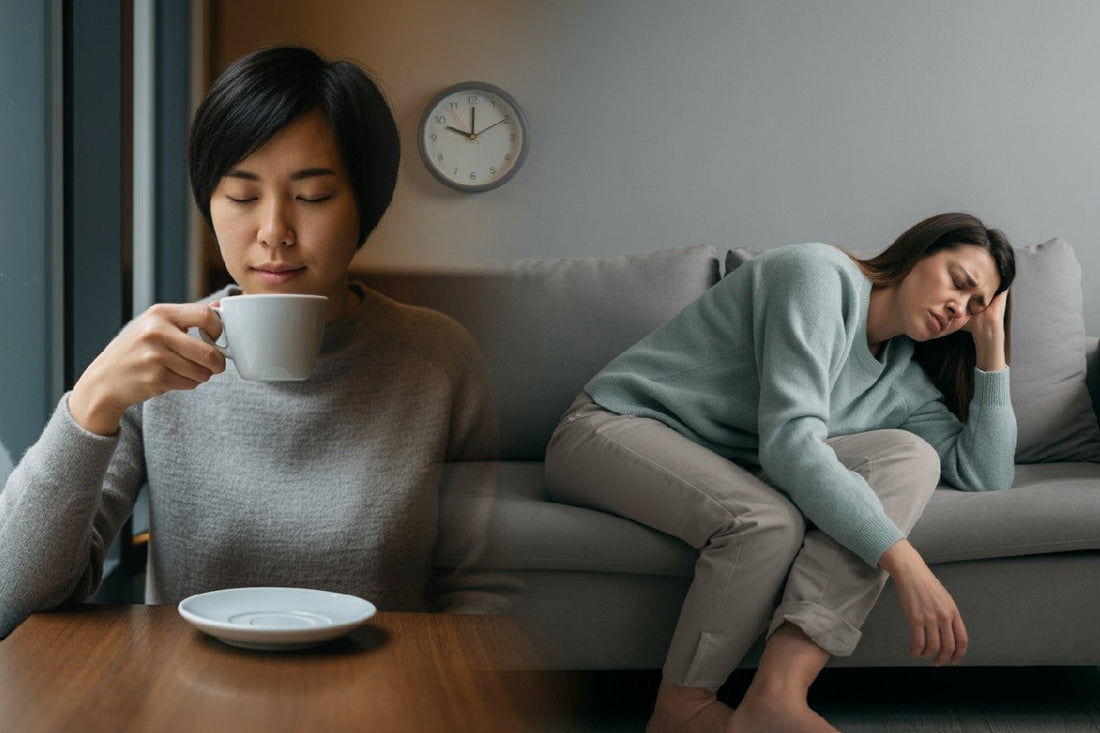
Why That 'Quick Coffee Meetup' Is Actually Exhausting You
Share
"Just a quick coffee?" they said. "It'll only take 30 minutes," they promised. Yet here you are, back home, collapsing on your couch with the overwhelming urge to nap for three hours.
If this scenario sounds all too familiar, you're not imagining things—and you're definitely not alone.
For many introverts, even the briefest social interactions can feel like running a silent marathon. But why does something so seemingly simple drain your energy so completely?
Ever wondered why a one-hour coffee date requires three hours of recovery? Keep reading to discover what's really happening beneath the surface of that "quick catch-up."
The Hidden Energy Costs Your Extroverted Friends Don't See
When an extrovert suggests grabbing a "quick coffee," they genuinely believe it's a low-effort activity.
But what they don't understand is that for introverts and deep thinkers, even casual social interactions involve complex mental processing that remains invisible to others.
Think about what's actually happening during that "simple" coffee meetup:
- Your brain is constantly analyzing social cues and facial expressions
- You're filtering your thoughts to determine what's appropriate to share
- You're managing impression management while trying to be authentic
- You're navigating small talk (which ironically requires more energy than deep conversation)
- You're processing environmental stimuli like cafe noise, movement, and lighting
✨ Have you ever noticed how exhausting it is to decide what parts of yourself to share?
This is what psychologists call "social processing load"—and for introverts, this load is significantly heavier. It's like running background apps on your phone; they drain your battery even when you're not actively using them.
Just as our Rest, Recharge, Repeat tee quietly expresses, your social energy is a finite resource that needs conscious management.
The Science Behind Your Social Exhaustion (It's Not "Just In Your Head")
There's actual neuroscience behind why that coffee meetup leaves you depleted. Research shows introverts' brains respond differently to social stimulation.
Here's what's really happening in your brain during that "quick coffee"...
Studies using brain imaging have found that introverts show more activity in regions responsible for internal processing, memory, and problem-solving. This means your brain is working overtime during social interactions, processing information more deeply and thoroughly than extroverted brains.
Dr. Marti Olsen Laney, author of "The Introvert Advantage," explains that introverts' energy depletion comes from differences in dopamine sensitivity and pathways. While extroverts get energized by the dopamine release that comes with social interaction, introverts process through a different, more energy-intensive pathway.
This is why wearing our "Quiet Mind, Bold Thoughts" tee isn't just a fashion statement—it's a recognition of how your brain actually works. Your quiet exterior masks an incredibly active internal world.
3 Quiet Ways to Manage Your Social Energy
Understanding what's happening is the first step. Now let's explore how to protect and manage your precious social battery:
1. Embrace Timed Interactions
- Set clear time boundaries before you meet ("I can join until 2:30")
- Use your phone timer as a gentle reminder when it's time to leave
- Practice exit phrases that feel natural and kind
2. Schedule Recovery Buffer Zones
- Block 30-60 minutes of alone time after social events
- Create a comforting post-social ritual (like changing into our "Peace, Quiet and Pajamas" t-shirt and brewing your favorite tea)
- Resist the urge to immediately check messages or emails during this time
3. Set Clear Expectations with Visual Cues
- Subtle visual communication can reduce the need for verbal boundary-setting
- Our Nope! tee does the talking so you don't have to
- Choose meeting spots that offer quiet corners or easy exit options
Here's a surprising insight about "social hangovers"...
One of the most validating discoveries for many introverts is learning about "social hangovers"—the physical and mental fatigue that follows social interaction. These can include symptoms like brain fog, physical tiredness, and even heightened sensitivity to sounds and lights.
Knowing this isn't weakness—it's your brain's natural response to overstimulation.
The Energy Budget Concept: A Game-Changer for Introverts
Think of your social energy like a daily budget. Each interaction costs a certain amount, and when the budget is spent, it's spent—no overdrafts allowed.
A helpful way to visualize this:
- A text conversation: 5-10 energy points
- A phone call: 20-30 energy points
- A coffee meetup: 50-70 energy points
- A group gathering: 80-100 energy points
Your total daily budget might be around 100 points. This helps explain why after that "quick coffee," you have little energy left for anything else social.
Our Silence, Recharging in Progress tee was designed specifically for those moments when your energy budget needs replenishing—a gentle reminder that rest isn't laziness, it's a necessary reset.
Finding Peace in Your Introvert Nature
Understanding the true cost of social interactions isn't about avoiding them entirely—it's about making informed choices that honor your needs.
The next time someone suggests a "quick coffee," you'll know it's never just about the coffee. It's about the complex social processing, the energy expenditure, and the recovery time needed afterward.
And remember: needing that recovery time isn't a flaw—it's simply how your beautifully complex, thoughtful mind works.
How do you recover after your "quick" social meetups? Share your quiet recharge rituals in the comments below. 💜
Looking for ways to subtly communicate your boundaries? Explore our Introvert Tees designed specifically for those who value peace, space, and thoughtful connection.





